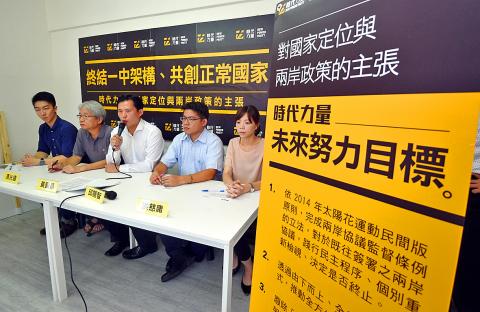The New Power Party (NPP) yesterday said its cross-strait policy would focus on demonstrating that Taiwan and China are two separate nations, while amending laws according to the cross-strait factual “status quo.”
“Chinese Nationalist Party [KMT] presidential hopeful Hung Hsiu-chu [洪秀柱] earlier proposed her ‘one China, same interpretation’ model, while President Ma Ying-jeou [馬英九] insists on ‘one China, with each side having its own interpretation,’ and KMT Chairman Eric Chu [朱立倫] said that the two sides of the Taiwan Strait both belong to ‘one China,’” NPP Acting President Huang Kuo-chang (黃國昌) told a news conference.
“Although their ideas might be slightly different, all sit under the framework of ‘one China,’ which is against the principles of national sovereignty and constitutional democracy, because Taiwan’s sovereignty belongs to the 23 million people of Taiwan, not to anyone in China,” he added.

Photo: Lo Pei-der, Taipei Times
Huang acknowledged that constitutional amendments define Taiwan as the free area of the Republic of China (ROC) and China as the mainland area of the ROC.
However, “it is clear that our sovereignty and jurisdiction do not cover the People’s Republic of China [PRC], so Taiwan and China are in a nation-to-nation relationship,” he added.
Justin Wu (吳崢), the chief executive director of NPP legislative candidate Freddy Lim’s (林昶佐) campaign office, said that the transition must begin with changing the Constitution.
“No one believes in the Constitution; it is outdated and full of defects, and is more like a fairy tale, because it denies the existence of the PRC, saying that it is the ‘mainland area’ of the ROC,” Wu said. “It is just so far from the facts.”
The 25-year-old political activist said that since birth, he and his colleagues have known their nation only as Taiwan, so China for them is just another foreign country.
Therefore, it is crucial to amend the Constitution to be in accordance with the facts, he said.
Reporters asked whether Huang would join the legislative race by running for district representation or as an at-large legislator in the Democratic Progressive Party (DPP).
Huang said that since he said last month that he would not run for the constituency in New Taipei City’s Sijhih District (汐止), he has not had any new thoughts about running.
When pressed on whether he would join the DPP as an at-large legislator, Huang said: “Impossible.”
“As an NPP member, I would maintain a competitive yet cooperative relationship with the DPP; we would strive to be the second-largest Taiwan-centric political party, with the goal to smash the KMT,” Huang said. “Therefore, it is impossible for me to join the DPP as an at-large legislator.”
The question stemmed from a call by the Taiwan Society North advocacy group urging members of all smaller pro-independence parties to join the DPP to endeavor for at-large seats.

Taiwan is stepping up plans to create self-sufficient supply chains for combat drones and increase foreign orders from the US to counter China’s numerical superiority, a defense official said on Saturday. Commenting on condition of anonymity, the official said the nation’s armed forces are in agreement with US Admiral Samuel Paparo’s assessment that Taiwan’s military must be prepared to turn the nation’s waters into a “hellscape” for the Chinese People’s Liberation Army (PLA). Paparo, the commander of the US Indo-Pacific Command, reiterated the concept during a Congressional hearing in Washington on Wednesday. He first coined the term in a security conference last

DEFENSE: The National Security Bureau promised to expand communication and intelligence cooperation with global partners and enhance its strategic analytical skills China has not only increased military exercises and “gray zone” tactics against Taiwan this year, but also continues to recruit military personnel for espionage, the National Security Bureau (NSB) said yesterday in a report to the Legislative Yuan. The bureau submitted the report ahead of NSB Director-General Tsai Ming-yen’s (蔡明彥) appearance before the Foreign and National Defense Committee today. Last year, the Chinese People’s Liberation Army (PLA) conducted “Joint Sword-2024A and B” military exercises targeting Taiwan and carried out 40 combat readiness patrols, the bureau said. In addition, Chinese military aircraft entered Taiwan’s airspace 3,070 times last year, up about

A magnitude 4.3 earthquake struck eastern Taiwan's Hualien County at 8:31am today, according to the Central Weather Administration (CWA). The epicenter of the temblor was located in Hualien County, about 70.3 kilometers south southwest of Hualien County Hall, at a depth of 23.2km, according to the administration. There were no immediate reports of damage resulting from the quake. The earthquake's intensity, which gauges the actual effect of a temblor, was highest in Taitung County, where it measured 3 on Taiwan's 7-tier intensity scale. The quake also measured an intensity of 2 in Hualien and Nantou counties, the CWA said.

The Overseas Community Affairs Council (OCAC) yesterday announced a fundraising campaign to support survivors of the magnitude 7.7 earthquake that struck Myanmar on March 28, with two prayer events scheduled in Taipei and Taichung later this week. “While initial rescue operations have concluded [in Myanmar], many survivors are now facing increasingly difficult living conditions,” OCAC Minister Hsu Chia-ching (徐佳青) told a news conference in Taipei. The fundraising campaign, which runs through May 31, is focused on supporting the reconstruction of damaged overseas compatriot schools, assisting students from Myanmar in Taiwan, and providing essential items, such as drinking water, food and medical supplies,